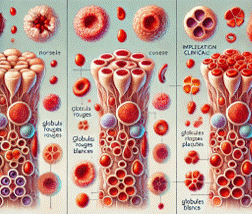Definition
Blood is composed of different types of cells: red blood cells, white blood cells (leukocytes), and platelets. These cells are produced in the bone marrow, a soft substance inside the bones. Normal blood cells all originate from a stem cell, a sort of "mother" to all blood cells.
In the case of clonal hematopoiesis, a genetic abnormality occurs in one of these stem cells in the bone marrow. This abnormality leads to an abnormal multiplication of this cell, forming a group of identical cells, called a "clone." This phenomenon can disrupt the normal production of blood cells (red/white/platelets) and lead to various diseases.
Types of clonal hematopoiesis associated with inflammation:
Clonal hematopoiesis includes several conditions, such as:
-
Myelodysplastic Syndromes (MDS): Disorders in which the bone marrow produces abnormal or insufficient blood cells.
-
Myeloproliferative Syndromes (MPS): Disorders involving excessive production of mature blood cells.
-
Clonal Hematopoiesis of Indeterminate Potential (CHIP): A clonal abnormality is present without symptoms but may increase the risk of cardiovascular diseases or hematological transformation.
These three categories can be accompanied by clinical and/or biological inflammation. In such cases, it is referred to as Clonal Hematopoiesis of Inflammatory Significance (CHIS).
Etiology
These conditions are not always hereditary. They often arise with age as the cells in our bodies accumulate mutations over time. Certain factors, such as exposure to toxic substances (chemicals, radiation) or previous cancer treatments, can also increase the risk.
Clinical
Symptoms may vary depending on the type of clonal hemopathy associated with the inflammation. They include :
-
Fatigue , due to a lack of red blood cells (anemia).
-
Repeated infections due to a drop in functional white blood cells.
-
Bleeding or bruising due to a lack of platelets.
-
Fever, arthralgia, digestive disorders, skin or mucous rashes, depending on the clonal disease.
Diagnostic
Diagnosis is based on blood tests and, sometimes, a bone marrow aspiration (myelogram). These tests detect blood cell and genetic abnormalities.
Evolution
Clonal hemopathies are a wide range of diseases that require special management.
Although they may seem alarming, increasingly effective treatments are available.
Treatment
Treatment depends on the type and severity of the clonal hemopathy:
-
Active surveillance for mild forms.
-
Drug treatments to control symptoms or regulate blood cell production.
-
Chemotherapy or bone marrow transplantation for more severe forms.


